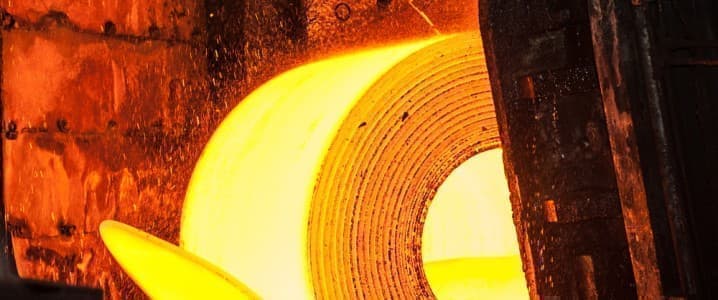Via Metal Miner
Market sources report that hot rolled coil steel prices in northern and southern Europe continued to decline in recent weeks due to slowing economies in Europe as well as overcapacity.
“I’m a little scared about Germany,” one trader told MetalMiner, referring to that country’s current economic situation. Germany’s economy is the largest in the European Union (EU), but projections state the country will grow just 0.2% in 2024. This is a significant decline from an earlier outlook of 1.3%. It’s also worth mentioning that the country’s economy contracted 0.3% in 2023.
Offers for the flat rolled product by steelmakers in the Benelux region currently exceed €700 ($765) per metric ton EXW, though the trader believes that they will sink below that level in the next couple of weeks. Meanwhile, northern European mills sought €720–730 ($785-795) in late February, a significant decrease from the €800 ($870) reported in late January. Looking further south, the trader noted that Italian mills quoted €670 ($730) last week, down 5.63% from €710 ($775) the week before.
Steel Prices in Western Europe and Asia
Many stockists and end users in Western Europe are holding out for further price declines. Furthermore, reports indicate that some want to see steel prices around €600 ($655) per metric ton before moving again. “Everybody’s holding back, then people are going to buy,” the trader noted. “There’s only so much time that you can wait.”
Historically high interest rates by the European Central Bank (ECB) also continue to impact demand. Currently, rates on the main refinancing operations, the marginal lending facility, and the deposit facility sit at 4.50%, 4.75%, and 4%, respectively. While the outlook is for the ECB to lower rates four times in 2024, the trader said that market players are currently hoping for an announcement citing an improved economic outlook in the year.
Sources also say that slower movement in Asian economies continues to put downward pressure on steel prices in that part of the world. Offers from Japan, Taiwan, and India are now €610-620 ($670-680) per metric ton CFR European ports, while reports indicate that Vietnamese mills are seeking less than €600 ($655).
Central Europe Could See a Shakeup from Polish Election
Meanwhile, financial support from the EU continues to create a very different market in Central and Eastern Europe, thus supporting prices for HRC. For instance, MetalMiner’s source reported that U.S. Steel Košice, in eastern Slovakia, currently wants €760 ($830) for delivery in March.
In Poland, Donald Tusk’s December election as Prime Minister will likely bode well for the country’s economy as he is one of the founders of the pro-European Civic Platform party. He was also head of the European Council from 2014 to 2019. Tusk recently replaced Prime Minister Mateusz Morawiecki of the Law and Justice Party, which is well-known for being more far more Euro-skeptic.
In addition, the European Commission approved the release of €137 million ($150 million) on February 29. A report by Euronews stated that these funds will allow the country to finance green, digital, and development projects. Concerns about the rule of law under Poland’s previous government prompted Brussels to freeze those payments.
ADVERTISEMENT
By Christopher Rivituso
More Top Reads From Oilprice.com:
- Developed Economies Could Stagnate As Fossil Fuels Reach Their Limits
- Bitcoin Continues To Sink Despite Bullish Bets by Big Banks
- Hot Inflation Data Raises Stakes for Tomorrow’s Fed Meeting


















